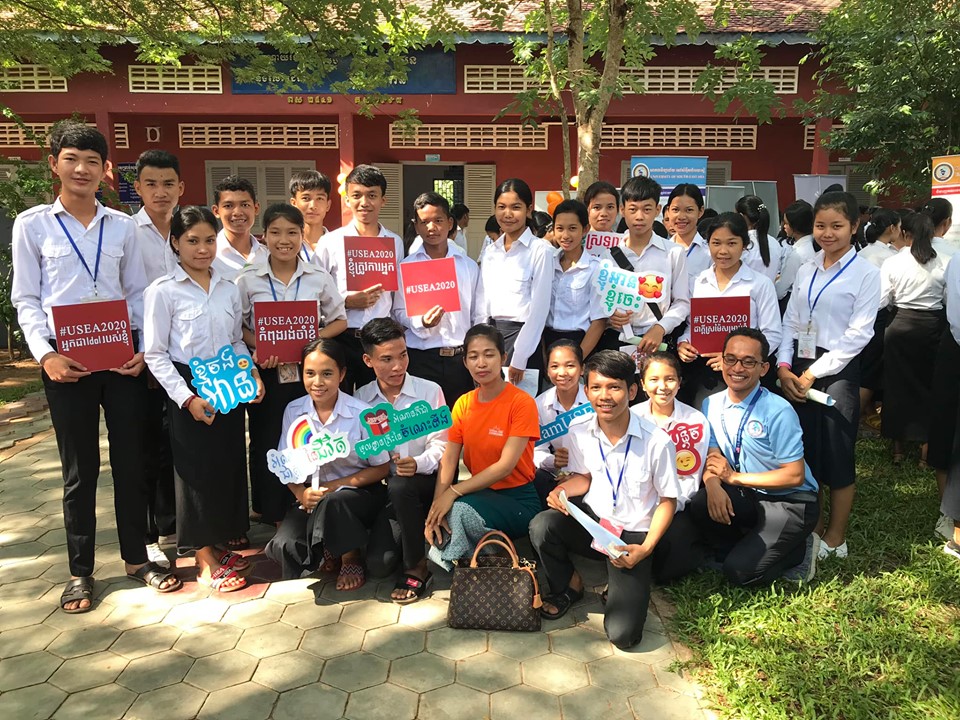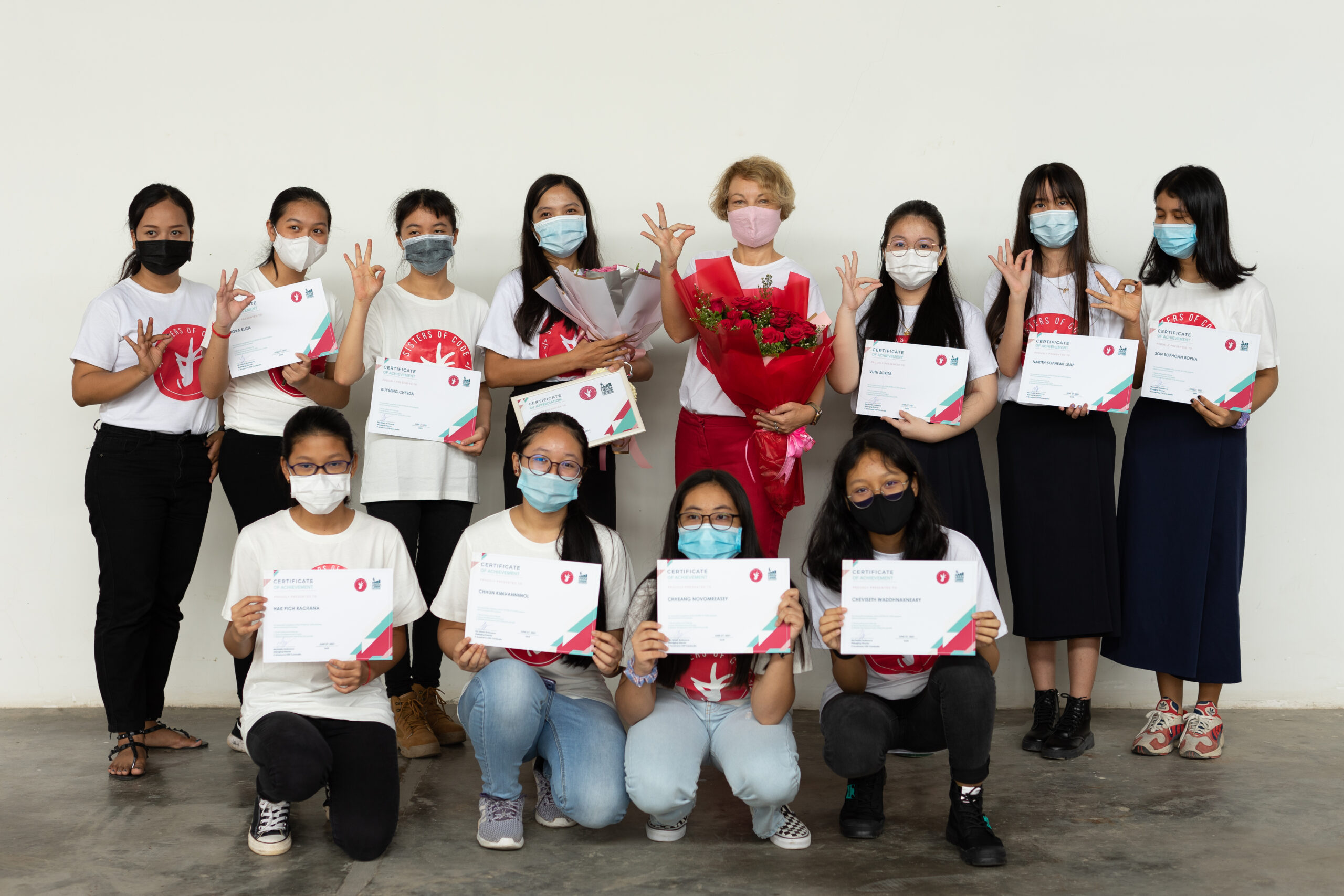The sooner the better is a common sentiment in the world of education, whether it’s an early introduction to the fundamentals of reading, writing and maths or the basic socialization and learning skills that develop in early childhood education.
It only makes sense that the same concept should be applied to exposing students to potential career paths open to them once they complete their education and become integrated into the nation’s economy. Unfortunately, this isn’t always the case.
“When students choose what they want to study, in terms of their future career pathways, the information for them to decide is still limited in Cambodia,” said Proloeng Top, a former research fellow at social policy think tank Future Forum.
Cambodia’s skills gap and the poor preparation of many graduates entering the workforce has been widely discussed. While there are significant structural challenges facing education in the country, career prep programmes could represent a mitigation strategy. By providing students with guidance and education helping them figure out how they best fit into the nation’s economy, they can focus their efforts on identifying and building the correct skills needed for their career path.
Future Forum’s 2020 report, The Cambodian Labor Market and Skills Gap, examines the issue through interviews with policy makers, NGOs and other key stakeholders. The findings by Proloeng and his team were not encouraging.
Their research found workers between the ages of 15 and 29 represent 49% of all labor in Cambodia, but of the roughly 300,000 young people joining the workforce every year, only 31% were found to have qualifications in line with employer needs.
The reality of these findings is more stark when viewed in the context of the Cambodian job market. According to the World Bank’s 2019 report, Cambodia’s Future Jobs, 94% of all jobs in the country are considered low-skill occupations, with managerial and professional positions accounting for just 5% of the market.
While a transition of unskilled agricultural workers from farms into service and manufacturing industries is a historical trend bearing some responsibility for the situation, the report identifies an information gap as a root cause of this mismatch.
“Policymakers should systematically produce and disseminate information about jobs inside and outside of Cambodia to help students, jobseekers, education and training institutes, and employers to make skills development choices that are aligned with rapidly evolving market demand,” the report suggested.
Within the context of Proloeng’s research, the lack of guidance that students receive pre-graduation has pushed many graduates away from more practical technical and vocational education and training (TVET) programmes in favor of attending university, where they often end up studying subjects that don’t translate to employability outside the classroom.
Outside of the capital, where schools generally lag behind Phnom Penh in terms of quality and capacity, while access to career preparation falls off dramatically, providing students with guidance is even more difficult.
“Basically it’s supposed to be the work of the National Employment Agency,” Proloeng explained. “They are supposed to provide information on training and also employment information. But this agency is not fully functioning in all the provinces.”

Launched in 2009 to collect and analyze labor data and provide quality employment services to people across the country, the National Employment Agency represents one facet of the government’s effort to reduce “the scarcity of basic technical knowledge and skills that is crucial to transform an unskilled labor-force into a skilled labor force” as detailed in the Cambodia Industrial Development Policy 2015-2025.
While the agency’s interactive website offers access to resources like pre-employment training, support for securing scholarships and information on upcoming job fairs, the service suffers from a lack of resources and limited capacity, especially in reaching students outside the capital.
Collaboration with non-governmental organizations is seen by many as an approach that could bridge this gap. A key aspect of the strategy to increase education and social services capacity, utilizing the skills and resources of these groups to provide students with employment information is proving useful in accomplishing government goals.
Education-focused NGO Caring for Cambodia is one group seeing the potential of this cooperation.
“It is very important that we give the experience to the students,” said Lay Tao, Deputy Director of Lifeskills who oversees the Career Prep programme. “So they can prepare themselves before they graduate high school and can know themselves before they go on to study.”
With schools in and around Siem Reap, the US-based NGO has been working to increase the quality and reach of education in Cambodia for nearly two decades, focusing on gender equity, community building and early childhood education. CFC’s career prep programme, recently buoyed by a sponsorship from the Prince Foundation, is helping students translate their education into success after graduation as they move from the classroom to the workplace.
Before, I didn’t know what I wanted to do and I didn’t know how university could help me,” Kong said. “But I learned how to set goals, find opportunities and go after them
Giving students a glimpse into a variety of careers ﹘ from hospitality and trades to information and communication technology careers ﹘ the programme uses job fairs, scholarship support and field trips to Phnom Penh universities and businesses to help students find areas that excite them.
Recent high school graduate Kong Tit credits participation in the programme with her current trajectory toward a public administration career. “When I learned about this career, I thought that I could get a job with the local government and help the people in the community,” she said.
By the time Kong graduated from high school, she had a career plan and access to a network of resources, along with the resilience and flexibility considered increasingly necessary in an uncertain and globalized economic landscape.
Kong, now a university student in Phnom Penh, sees the encouragement she received in the prep programme as key to finding a fulfilling career she believes will provide for herself and her family.
“Before, I didn’t know what I wanted to do and I didn’t know how university could help me,” Kong said. “But I learned how to set goals, find opportunities and go after them.”
The work being done outside the capital provides an example of the potential of these programmes to give students an early start on a career path. But back in Phnom Penh, some groups have an even more ambitious vision for the future of work in the Kingdom.
“My wildest dream is that Cambodia has a little Silicon Valley in the country,” said Piseth Leng, founder of the Phnom Penh-based computer programming academy, Sabai Code. “That takes a lot, a whole community, a whole ecosystem to make it happen. But it starts with a dream.”
Born and raised in Cambodia, Piseth graduated from the Royal University of Phnom Penh before leaving for the US to pursue an MBA. He eventually landed in Silicon Valley and, during his time in California’s tech-centred Bay Area, worked his way up the ranks of the area’s thriving fintech scene. His career won him valuable contacts with heavyweights such as Google and Amazon but, throughout it all, his homeland remained close to heart.
Initially offering programmes in computer science and robotics that give middle and high school students their first real taste of technology, after local companies expressed their need for skilled programmers Piseth’s vision of providing life-changing education coalesced in the addition of a full-stack coding bootcamp. Drawing on his knowledge of the fast-paced industry and the coding expertise of his Phnom Penh-based co-founder Sareoun Soum, the intensive, 12-month Sabai Code programme is designed to give students all the experience needed to enter the global workforce. A recent partnership with Caring for Cambodia is helping Piseth extend Sabai Code’s reach beyond the capital.
“The first step, for me, is that these kids are good enough that they can work for American companies remotely,” Piseth explained.
Our goal is to give them confidence that coding is not only for boys. Computer science is not related to gender. To open the door and show them it’s not as complicated and not as scary as they think
Before diving headlong into an intensive coding bootcamp, the first step is getting young people interested in technology. And for Latvian born Natalja Rodionova, the founder of Sisters of Code, a computer programming club helping Cambodian girls discover STEM, this has to be equal-access.

“Our goal is to give them confidence that coding is not only for boys. Computer science is not related to gender,” she explained to the Globe from her office in Phnom Penh. “To open the door and show them it’s not as complicated and not as scary as they think.”
Arriving in Cambodia in 2015, Rodionova recognized the added challenges girls face when pursuing an interest in computers. She established the country’s first coding camp focused on providing real-world skills to girls attending public schools. In the four years since launching Sisters of Code, the programme has provided more than 200 girls as young as 9 years old the opportunity to learn the fundamentals of computer science and how the discipline can provide an employment path after graduation.

The hard skills of coding and website development are not the only lessons girls receive in the 18-week programme. Vital to Sisters of Code’s learning process are collaboration, critical thinking and problem solving, skills that translate into every profession and contribute to the success of the group. Rodionova said every student so far has landed a job upon graduation, either in tech or another field.
“They become more confident in their abilities and themselves, they are more focused on problem solving and creativity. They understand the value of teamwork and they can better represent themselves,” she said. “This kind of programme is a real, practical step to increasing competitiveness.”
This article has been written in partnership with Caring for Cambodia, as a part of an ongoing series exploring education in Cambodia and the steps being made to bring hope to future generations. Find out more here.



